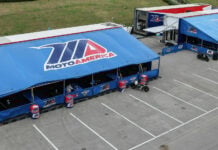The Parts Canada Superbike Championship’s premier class will be based on open-class production machines, with a dyno-enforced horsepower limit. The move away from 750cc four-cylinder and 1000cc Twin-cylinder Superbikes is a cost-cutting move and has the support of manufacturers participating in the series, according to series boss Colin Fraser.
An official press release issued on the move follow:
NEW RULES PACKAGE RELEASED
TORONTO, ON – A stock-based headline class, called Superbike, will be the foundation of the new Parts Canada Superbike Championship rules set to debut in 2003.
The new Superbike class will resemble the existing International Motorcycle SUPERSHOW Open Sport Bike division, with dyno-enforced maximum horsepower limitations. Modifications beyond current Open Sport Bike guidelines will permit changes to triple clamps and shock linkages.
The new Superbike category will also be similar to Formula USA’s current Unlimited Superbike feature class.
The Open Sport Bike category will disappear after the 2002 season. It will be replaced by an Amateur 600 Sport bike class, which will run alongside the existing Yoshimura 600 Sport Bike division. All three classes will receive television coverage.
The new rules package comes after two years of deliberation between Parts Canada Superbike Championship officials and representatives of Honda, Kawasaki, Suzuki and Yamaha, along with rider input. The format is designed to reduce the cost of competing in the national motorcycle road race series and encourage more riders to participate.
“A lot of discussion went into this,” said Colin Fraser of Professional Motorsports Productions, organizer of the Parts Canada Superbike Championship. “While it is always hard to please everybody, we think we have a program that will appeal to the teams, racers and the many fans that enjoy our series.”
The change in feature class format will see the disappearance of exotic and expensive works motorcycles imported from Japan, which have appeared in the Parts Canada Superbike Championship over the past two years.
Bikes like Honda’s RC51, winner of the past two titles in the hands of Steve Crevier, and the Kawasaki ZX-7RR raced last year by Owen Weichel will be grandfathered, with restrictions for 2003.
Under the new regulations each of the four Japanese manufacturers will be expected to support a minimum of three riders with bikes and parts in both the Superbike class and the Pro 600 Sport Bike division. Direct factory support for Amateur 600 Sport Bike competitors will not be permitted.
The creation of a national Amateur 600 Sport Bike class should further assist the development of young Canadian racers. The category will be open to Amateur class license holders across Canada and the champion will receive a major career enhancement award.
“This class will lead Amateur racers directly into the national system,” Fraser said. “It will give them valuable exposure and provide the means for them to continue their racing careers.”
For more series information, visit www.cdnsuperbike.com
Canadian Series Will Feature Dyno-controlled Open Class In 2003
Canadian Series Will Feature Dyno-controlled Open Class In 2003
© 2002, Roadracing World Publishing, Inc.






